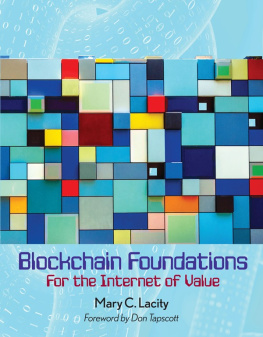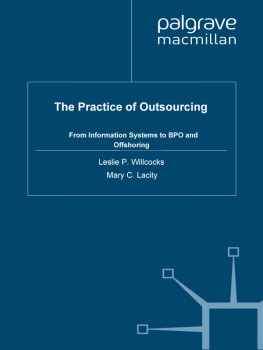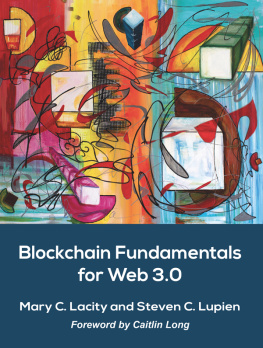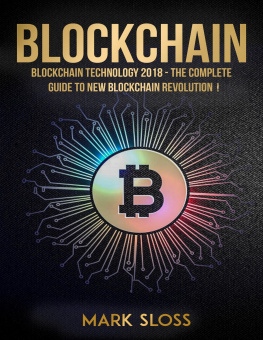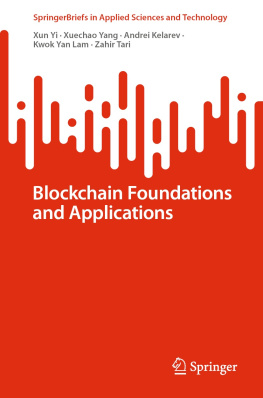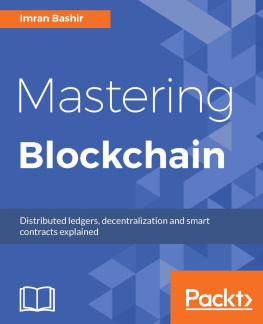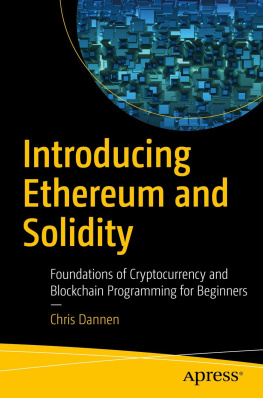Mary C. Lacity - Blockchain Foundations
Here you can read online Mary C. Lacity - Blockchain Foundations full text of the book (entire story) in english for free. Download pdf and epub, get meaning, cover and reviews about this ebook. year: 2022, publisher: Epic Books, genre: Home and family. Description of the work, (preface) as well as reviews are available. Best literature library LitArk.com created for fans of good reading and offers a wide selection of genres:
Romance novel
Science fiction
Adventure
Detective
Science
History
Home and family
Prose
Art
Politics
Computer
Non-fiction
Religion
Business
Children
Humor
Choose a favorite category and find really read worthwhile books. Enjoy immersion in the world of imagination, feel the emotions of the characters or learn something new for yourself, make an fascinating discovery.
- Book:Blockchain Foundations
- Author:
- Publisher:Epic Books
- Genre:
- Year:2022
- Rating:3 / 5
- Favourites:Add to favourites
- Your mark:
- 60
- 1
- 2
- 3
- 4
- 5
Blockchain Foundations: summary, description and annotation
We offer to read an annotation, description, summary or preface (depends on what the author of the book "Blockchain Foundations" wrote himself). If you haven't found the necessary information about the book — write in the comments, we will try to find it.
Blockchain Foundations — read online for free the complete book (whole text) full work
Below is the text of the book, divided by pages. System saving the place of the last page read, allows you to conveniently read the book "Blockchain Foundations" online for free, without having to search again every time where you left off. Put a bookmark, and you can go to the page where you finished reading at any time.
Font size:
Interval:
Bookmark:

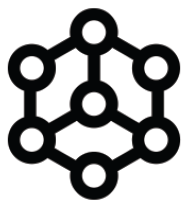
An Epic Books publication
(Imprint of The University of Arkansas Press)
Cover design:
Nick Sample
www.nicksample.co.uk
Editor & layout designer:
Steve Brookes
SB Publishing
Stratford-upon-Avon, UK
www.sbpublishing.org
Cover artwork image:
Synchonicity of Colour: Blue by Margo Sawyer, 2008
www.margosawyer.com
Installation at Discovery Green, Houston, Texas, USA
www.discoverygreen.com
Author:
Mary C. Lacity
Published in 2020 by:
Epic Books (an imprint of University of Arkansas Press)
Text copyright 2020 Mary C. Lacity
All rights reserved. No part of this publication may be reproduced, stored in a retrieval system, or transmitted in any form or by any means, electronic, mechanical, photocopying, recording or otherwise, without the prior permission of the copyright owner. The right of Mary C. Lacity to be identified as the author of this work has been asserted by her in accordance with the Copyright, Designs, and Patents Act 1988. All enquiries regarding any extracts or re-use of any material in this book should be addressed to the publisher.
ISBN: 978-1-682261-57-6
Printed and bound in the USA by University of Arkansas Press
ISBN-13: 978-1-61075-745-4 (electronic)
Figures
Tables
Blockchain: An idea that has become a necessity
This is one of those rare turning points in history and Mary Lacitys enormously helpful and instructive book Blockchain Foundations for the Internet of Value is a timely one. The COVID-19 pandemic will profoundly change our behavior and society. Many institutions will come under scrutiny and, we hope, change for the better.
At the Blockchain Research Institute, were doing our part to facilitate positive change. Technologies like artificial intelligence, the Internet of Things, augmented/virtual reality, and above all, blockchain, are more relevant than evernot just to business and the economy but to the future of public health and the safety of global populations. Traditional systems have failed us and its time for a new paradigm. To build on Victor Hugo, Nothing is more powerful than an idea that has become a necessity. To avoid and manage pandemics the world needs the Internet of Value. Its time for a new paradigm.
In Blockchain Revolution, Alex Tapscott and l argued this Internet of Value represents a second era of the Internet. The first era was defined by informationthe Internet of Information, a peer-to-peer mechanism for communicating information and collaborating online. While it has enabled companies to interact directly with consumers, take orders online, and deliver digital goods, services, and experiences, it has not fundamentally changed how we do business. Companies and markets are still vertically or horizontally integrated hierarchies, relatively opaque and insular, and relatively slow to change. We can say the same of public institutions.
With the Internet of Information, we have to rely on powerful intermediaries to exchange things of value. Governments, banks, digital platforms such as Amazon, eBay, and AirBnB, and universities do the work of establishing our identity, vouching for our trustworthiness, and helping us to acquire and transfer assets and settle the transactions.
Overall, they do a pretty good jobbut there are limitations. They use centralized servers, which can be hacked. They take a piece of the value for performing this servicesay 10 percent to send some money internationally. They capture our data, not just preventing us from using it for our own benefit but often undermining our privacy. These intermediaries are sometimes unreliable and often slow. They exclude two billion people who dont have enough money to justify a bank account, let alone an education. Most problematic, they are capturing the benefits of the digital age asymmetrically.
We posed the question: What if there was an Internet of valuea global, distributed, highly secure platform, ledger, or database where we could store and exchange things of value and trust each other without powerful intermediaries? That is the blockchain. Collective self-interest, hard-coded into this new native digital medium for value, would ensure the safety, security, and reliability of our exchanges online. Trust is programmed into the technology, which is why we call blockchain the Trust Protocol.
Combine AI and Machine Learning with blockchain and this represents the second era of the digital age. Every institution will change profoundly. How about the corporation, a pillar of modern capitalism? With the rise of a global peer-to-peer platform for identity, trust, reputation and transactions, we will be able to re-engineer deep structures of the firm, for innovation and shared value creation. Were talking about building 21st century companies that look more like networks rather than the vertically integrated hierarchies of the industrial age. The whole financial service industry is already being reinvented by blockchain and others will soon follow. How well does todays university prepare students for such a future?
How about the Internet of Things? In the not-too-distant future, billions of smart thingsin the physical world will be sensing; responding; communicating; sharing important data; generating, buying and selling their own electricity; and doing everything from protecting our environment to managing our health. It turns out, this Internet of Everything needs a Ledger of Everything.
One of the biggest opportunities is to free us from the grip of a troubling prosperity paradox. The economy is growing but fewer people are benefiting. Rather than trying to solve the problem of growing social inequality through redistribution alone, we can change how wealthand opportunityis predistributed in the first place, as people everywhere, from farmers to musicians, can use this technology to share more fully in the wealth they create.
Blockchain and Pandemics
Given the urgent need for global solutions to the Covid-19 pandemic, the Blockchain Research Institute convened a virtual roundtable of 30 experts from five continents. We discussed the challenges of COVID-19 and the possibilities of using blockchain in areas of need. In our special report, Blockchain Solutions in Pandemics, we developed a framework for facing pandemics together in these five areas.
1. Self-sovereign identity, health records, and shared data
Data is the most important asset in fighting pandemics. If any useful data exists now, it sits in institutional silos. We need better access to the data of entire populations and a speedy consent-based data sharing system. To accelerate discovery, the blockchain start-up, Shivom, is working on a global project to collect and share virus host data in response to a call for action from the European Unions Innovative Medicines Initiative. In Honduras, Civitasan app developed by the start-up Emergeis linking Hondurans' government-issued ID numbers with blockchain records used to track medical appointments. Doctors simply scan the app to review a patient's symptoms verified and recorded by telemedicine services. And Dr. Raphael Yahalom of MIT and Oxford-Hainan Research Institute is working on Trustup, a trust-reasoning framework that cansystematically highlight the ways in which health data recorded on a blockchain ledger is more trustworthy than data stored in conventional databases. The trade-off between privacy and public safety need not be so stark. Through self-sovereign identities where individuals own their health records and can freely volunteer it to researchers, we can achieve both.
Font size:
Interval:
Bookmark:
Similar books «Blockchain Foundations»
Look at similar books to Blockchain Foundations. We have selected literature similar in name and meaning in the hope of providing readers with more options to find new, interesting, not yet read works.
Discussion, reviews of the book Blockchain Foundations and just readers' own opinions. Leave your comments, write what you think about the work, its meaning or the main characters. Specify what exactly you liked and what you didn't like, and why you think so.

